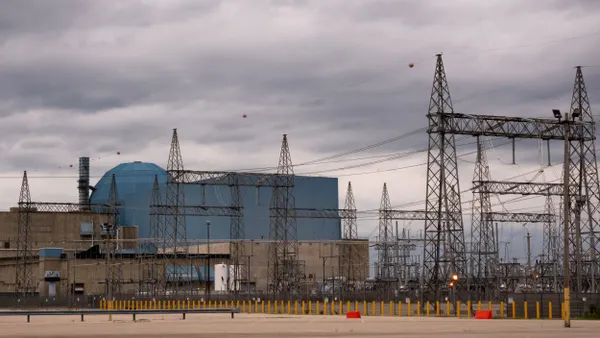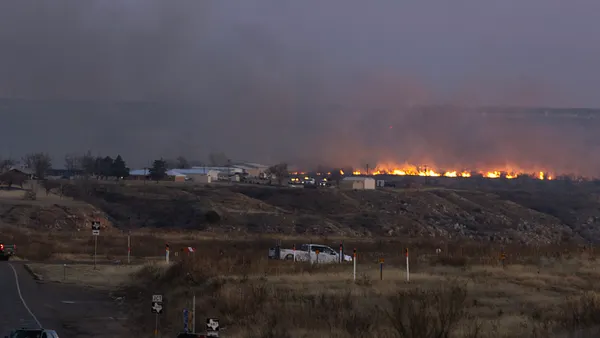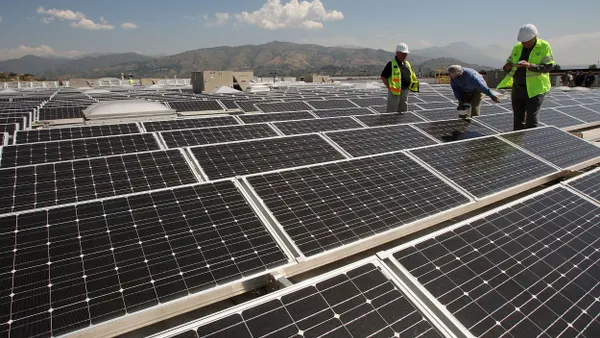Dive Brief:
-
California state officials confirmed on Thursday that Pacific Gas & Electric's transmission lines caused the October 2019 Kincade Fire, opening the utility up to the possibility of criminal charges from a Northern California county district office.
-
The finding comes from the California Department of Forestry and Fire Protection, which compiled an investigation report into the fire's origins, currently under review at the Sonoma County District Attorney's office. The Kincade Fire burned roughly 78,000 acres and prompted large-scale evacuations in the region.
-
PG&E, which emerged from Chapter 11 bankruptcy on July 1, is also facing a lawsuit from a group of individuals and businesses seeking damages for the Kincade Fire. The utility previously estimated it could face a $600 million loss due to the blaze.
Dive Insight:
The Kincade Fire occurred 10 months after PG&E filed for bankruptcy, and did not factor into the $25.5 billion payout PG&E negotiated to resolve its wildfire liabilities.
According to CAL FIRE's investigation, PG&E transmission lines near Geyserville in Sonoma County were the cause of the fire, while dry vegetation, strong winds and weather conditions contributed to its spread. The agency cannot release its report publicly because it is part of an active investigation at the county district attorney's office, Christine McMorrow, a CAL FIRE spokesperson, told Utility Dive.
"We are aware of CAL FIRE's news release stating that PG&E facilities caused the fire. At this time, we do not have access to CAL FIRE's investigative report or the evidence it has collected. We look forward to reviewing both at the appropriate time," PG&E said in a statement.
The Sonoma County District Attorney's office received the report on Thursday and has just started the process of reviewing it to see if the office needs to bring any charges against PG&E, according to spokesperson Brandon Gilbert. He told Utility Dive he did not know whether CAL FIRE has identified any violations related to vegetation management in connection with the fire.
PG&E's power lines have been responsible for causing a series of wildfires in Northern California over the last few years, which eventually pushed the utility into bankruptcy in January 2019. Last month, the utility pleaded guilty to 84 counts of involuntary manslaughter related to the 2018 Camp Fire, the most destructive wildfire in California's history.
The financial implications of CAL FIRE's finding for PG&E are still unclear. While PG&E is facing a lawsuit over the Kincade Fire, plaintiffs have not specified how much they're seeking in damages.
Jack Weaver, an attorney for the victims, said in a statement that he is gratified that county officials are looking into possible criminal charges against PG&E.
But CAL FIRE's report doesn't change anything, he told Utility Dive. "It simply supports what we've been saying all along, and that which the residents knew, which is that PG&E's negligence in maintaining their equipment sparked the Kincade Fire."
Unlike previous years, PG&E now has access to the $21 billion wildfire insurance fund created by California lawmakers in 2019. But utilities cannot access the fund unless the total damages exceed $1 billion, Lynsey Paulo, a spokesperson for PG&E, told Utility Dive. PG&E has not yet been able to review CAL FIRE's report, "so at this time we're not going to speculate on our need to access the fund," she added.
At the time of the fire, PG&E had private wildfire insurance amounting to $430 million, according to Paulo.
PG&E's access to the fund is also conditioned on the California Public Utilities Commission determining that it operated its equipment prudently. But this process faces its own challenges, Michael Wara, senior research scholar at the Woods Institute for the Environment and director of the Climate and Energy Policy Program at Stanford University, told Utility Dive.
"Part of what has made all of this so challenging is not understanding very clearly when the utility is prudent or imprudent relative to a fire. There's cases where they're clearly imprudent, like the Camp Fire, but there's a lot of gray," Wara said.
"One thing that the wildfire fund is going to do is to force the commission to make these determinations more frequently," he added.














